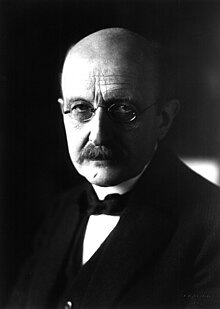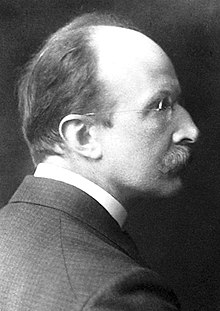माक्स् प्लाङ्क्
(Max Planck इत्यस्मात् पुनर्निर्दिष्टम्)
सः विख्यातः वैज्ञानिकः।
| माक्स प्लान्क | |
|---|---|
 | |
| जननम् |
२३ १८५८ Kiel, Duchy of Holstein |
| मरणम् |
४ १९४७ (आयुः ८९) Göttingen, Lower Saxony, Germany |
| देशीयता | German |
| कार्यक्षेत्राणि | Physics |
| संस्थाः |
University of Kiel University of Berlin University of Göttingen Kaiser-Wilhelm-Gesellschaft |
| मातृसंस्थाः | Ludwig Maximilian University of Munich |
| संशोधनमार्गदर्शी | Alexander von Brill |
| शोधच्छात्राः |
Gustav Ludwig Hertz Erich Kretschmann Walther Meissner Walter Schottky Max von Laue Max Abraham Moritz Schlick Walther Bothe Julius Edgar Lilienfeld |
| विषयेषु प्रसिद्धः |
Planck constant Planck postulate Planck's law of black body radiation |
| प्रमुखाः प्रशस्तयः | Nobel Prize in Physics (1918) |
| धर्मः | Lutheran[१] |
|
हस्ताक्षरम् | |
|
विशेषम् He is the father of Erwin Planck who was executed in 1945 by the Gestapo for his part in the 20 July plot. | |

बाह्यसम्पर्कतन्तुः
सम्पादयतु- Annotated bibliography for Max Planck Archived २००६-०८-२८ at the Wayback Machine from the Alsos Digital Library for Nuclear Issues
- Max Planck – Encyclopædia Britannica article
- Max Planck Biography – www.nobel-prize-winners.com
- Max Planck Institutes of Natural Science and Astrophysics
- Cinematic self-portrait of Max Planck Archived २००९-०४-०६ at the Wayback Machine, Berlin-Brandenburgische Akademie der Wissenschaften, 1942
- Nobel Biography
- Life–Work–Personality – Exhibition on the 50th anniversary of Planck's death
- ↑ The dilemmas of an upright man: Max Planck and the fortunes of German science. J. L. Heilbron. Harvard University Press, 2000. ISBN 0-674-00439-6. p.183.